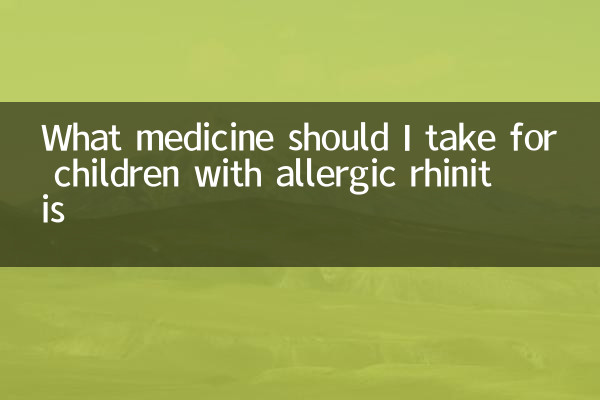What medicine should I take for children with allergic rhinitis
Allergic rhinitis is one of the common diseases in children, and is more likely to occur in seasons when the seasons are alternating or pollen is flying. For parents, it is crucial to understand the medication choices for allergic rhinitis in children. This article will combine popular topics and hot contents on the Internet for the past 10 days to introduce you in detail the medication guide for allergic rhinitis in children.
1. Common symptoms of allergic rhinitis in children

Allergic rhinitis in children is mainly manifested as nasal congestion, runny nose, sneezing, nasal itching, etc. In severe cases, it may also be accompanied by itchy eyes and tears. These symptoms not only affect children's daily life, but may also interfere with sleep and study.
| symptom | Incidence rate | Remark |
|---|---|---|
| Nasal congestion | 85% | The most common symptoms |
| Runny nose | 75% | Mostly clear watery nose |
| sneeze | 65% | Multiple sneezes in succession |
| Itchy nose | 60% | Rub your nose frequently |
2. Common medicines for allergic rhinitis in children
According to the hot discussions and expert suggestions on the entire network in the past 10 days, the medication for allergic rhinitis in children mainly includes the following categories:
| Drug Type | Representative medicine | Applicable age | Usage Dosage |
|---|---|---|---|
| Antihistamines | Loratadine, cetirizine | Over 2 years old | Once a day, 5-10mg each time |
| Nasal hormones | Mometasone furoate, fluticasone | Over 3 years old | 1-2 sprays per day |
| Leukotriene receptor antagonists | Montelukast sodium | More than 6 months | 4-5mg once a day |
| Decongestant | Pseudoephedrine | Over 2 years old | Short-term use for 3-5 days |
3. Precautions for medication use
1.Age restriction: Different drugs have strict restrictions on the age of children, and parents must follow the doctor's advice.
2.Treatment control: Nasal hormones need to be used continuously for 2-4 weeks before they can be effective, and you cannot stop the medication at will.
3.Side effects observation: Long-term use of hormone drugs may affect growth and development, and regular follow-up visits are required.
4.Combination medication: Severe symptoms may require combined medication, but doctors need guidance.
4. Non-drug treatment recommendations
In addition to drug treatment, parents can also take the following measures to help their children relieve symptoms:
| measure | Specific methods | Effect |
|---|---|---|
| Environmental Control | Keep the room clean and use an air purifier | Reduce allergen exposure |
| Nasal rinsing | Rinse the nasal cavity with normal saline | Relieve nasal congestion symptoms |
| Diet conditioning | Increase vitamin C and omega-3 intake | Strengthen immunity |
| Work and rest rules | Ensure adequate sleep | Improve allergic fitness |
5. Recent hot discussions
According to the hot content of the entire network for the past 10 days, the following topics have attracted much attention:
1.Application of novel biological agents: The application of biological agents such as omalizumab in children with allergic rhinitis has become a hot topic.
2.The auxiliary effects of probiotics: Multiple studies have shown that specific probiotic strains may improve allergic symptoms.
3.Traditional Chinese Medicine Therapy: The application effect of Chinese medicine prescriptions such as Yupingfeng Powder in children with allergic rhinitis has sparked discussion.
4.Immunotherapy: The long-term efficacy and safety of sublingual immunotherapy (SLIT) have attracted much attention.
6. Expert advice
Based on the views of many experts, the medication recommendations for allergic rhinitis in children are as follows:
1. Second-generation antihistamines, such as loratadine or cetirizine, are preferred for mild symptoms.
2. It is recommended to use glucocorticoids for nasal use, such as mometasone furoate nasal spray for moderate to severe symptoms.
3. Children with asthma may consider using leukotriene receptor antagonists.
4. Immunotherapy can be considered when the drug treatment is not effective.
5. Any medication plan should be carried out under the guidance of a doctor, and do not take medication on your own.
Conclusion
Although allergic rhinitis in children is common, most children can be well controlled through reasonable drug treatment and life conditioning. Parents should pay close attention to changes in their children's symptoms, conduct regular follow-up visits, and adjust medication plans under the guidance of a doctor. At the same time, maintaining a healthy lifestyle and a good family environment is equally important for preventing and relieving symptoms of allergic rhinitis.

check the details

check the details